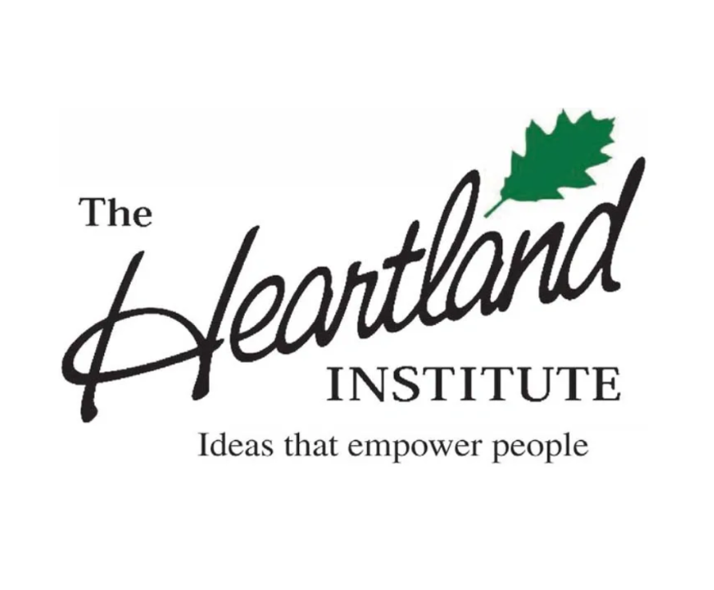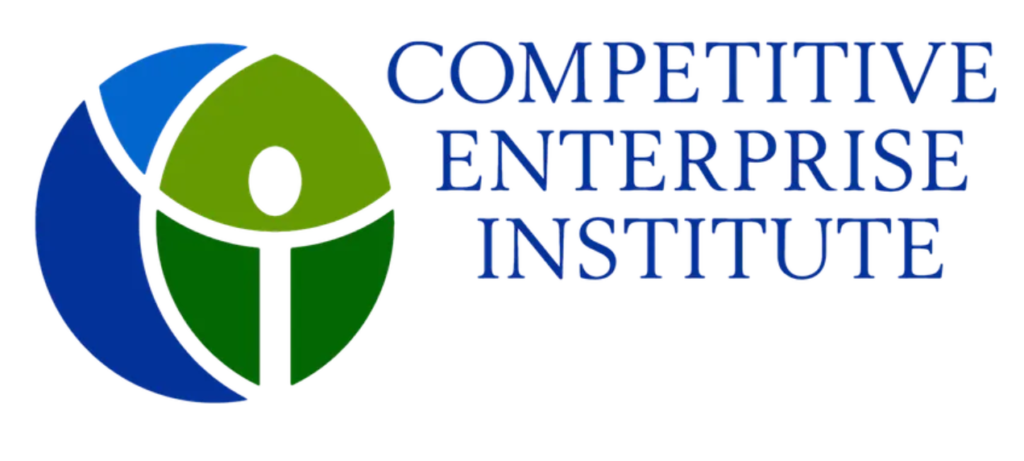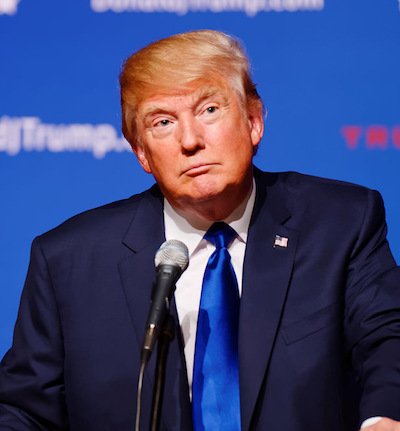American Institute for Economic Research (AIER)
Background
The American Institute for Economic Research (AIER) is a 501(c)(3) nonprofit organization (EIN 04-2121305) in the town of Great Barrington, Massachusetts. AIER describes itself as “dedicated to developing and promoting the ideas of pure freedom and private governance.” Edward C. Harwood (1900–1980) founded the American Institute for Economic Research in 1933.1“Who We Are,” AIER. Archived October 19, 2020. Archive URL: https://archive.vn/faFN0 2“Edward C. Harwood: A Biographical Sketch in Film,” AIER, March 20, 2019. Archived October 19, 2020. Archive URL: https://archive.vn/wgI7O
AIER‘s president, Edward Stringham, earned his PhD. from George Mason University where his professors included Peter J. Boettke, who also serves as a senior fellow at AIER. George Mason University, its Mercatus Center, and its other associated institutes and centers have received more funding from Koch Family charitable foundations than any other organization. Boettke is a professor of Economics and Philosophy at GMU and also director of its F. A. Hayek Program for Advanced Study in Philosophy, Politics, and Economics at the Mercatus Center. AIER itself received over $60,000 from Koch foundations in 2018.3Edward Stringham. “Stringham appointed as the Davis Professor for Economic Organizations and Innovation at Trinity College,” ThinkMarkets, May 20, 2015. Archived October 22, 2020. Archive URL: https://archive.vn/YQUpU 4“Peter J. Boettke,” Peter-Boettke.com. Archived October 22, 2020. Archive URL: https://archive.vn/YQUpU
Stringham is also on the editorial board of the Journal of Private Enterprise, on the board of scholars of the Foundation for Economic Education, and past president of both the Society for the Development of Austrian Economics and Association of Private Enterprise Education.5Edward Peter Stringham’s CV, as of Fall 2020. Retrieved from Trinity College. Archived .pdf on file at DeSmog. He is a faculty member of Trinity College in Hartford, Connecticut.6“Edward Stringham,” Trinity College faculty profile. Archived October 22, 2020. Archive URL: https://archive.vn/MKMX9
AIER also runs the Bastiat Society program, which it describes as “a global network of business professionals committed to advancing free trade, individual freedom, and responsible governance.” The network includes chapters across the United States, as well as in Latin America, Africa, Europe, and Asia.7“About the Bastiat Society,” AIER. Archived October 20, 2020. Archive URL: https://archive.vn/7y6N3
AIER‘s “sister organization,” the Progress Foundation—also founded by Edward C. Harwood—is located in Zurich, Switzerland and focuses on awarding stipends to students at Swiss universities to fund their studies at the AIER.8“Our Staff,” AIER.org. Archived April 25, 2008. Archive URL: https://archive.is/Wj0UQ 9“HISTORY,” Progress Foundation. Archived October 22, 2020. Archive URL: https://archive.vn/LpKqX
AIER also owns American Investment Services (AIS), an investment advisory group which helps provide “earnings” to fund AIER. A number of AIS‘s investments are in the fossil fuel and petrochemical industries with holdings including Chevron, Duke Energy, Dow Chemical, FirstEnergy, Entergy, NextEra Energy, OGE Energy, Philip Morris International, Xcel Energy, and ExxonMobil among others.10“The Global Warming Debate: Science, Economics, and Policy” (PDF), Economic Education Bulletin (Published by AIER), Vol. XLVIII No. 5 (May 2008). Archived .pdf on file at DeSmog.
AIER is a member and has received funding from the Atlas Network, a group that has supported free-market think tanks across the US and worldwide.11Lee Fang. “SPHERE OF INFLUENCE: HOW AMERICAN LIBERTARIANS ARE REMAKING LATIN AMERICAN POLITICS,” The Intercept, August 9, 2017. Archived October 19, 2020. Archive URL: https://archive.vn/594Pw
The Great Barrington Declaration
In October 2020, AIER sponsored the “Great Barrington Declaration,” a controversial statement advocating for a herd immunity strategy in response to the COVID-19 pandemic. The World Health Organization and other health experts have suggested a herd immunity strategy would be “unethical,” dangerous, and deadly.12“Dozens of public health groups, experts blast ‘herd immunity’ strategy backed by White House,” The Hill, October 15, 2020. Archived October 21, 2020. Archive URL: https://archive.vn/OIw8m 13“WHO chief says herd immunity approach to pandemic ‘unethical‘,” The Guardian. October 12, 2020. Archived October 21, 2020. Archive URL: https://archive.vn/VzXle
AIER also registered the domain name for the website hosting the declaration, gbdeclaration.org:14“Climate Science Denial Network Behind Great Barrington Declaration,” Byline Times, October 9, 2020. Archived October 19, 2020. Archive URL: https://archive.vn/ihgEF 15Domain Whois record for gbdeclaration.org. CentralOPS. Report generated October 19, 2020. Archived .pdf on file at DeSmog.

^Screenshot of WHOIS data via CentralOPS (emphasis added)
On October 3, AIER hosted a private gathering in response to the COVID-19 pandemic that included Professor Sunetra Gupta, a proponent of the herd immunity strategy. The declaration reads:16“Great Barrington Declaration,” gbdeclaration.org. Archived October 19, 2020. Archive URL: https://archive.vn/4NCm5
“The most compassionate approach that balances the risks and benefits of reaching herd immunity, is to allow those who are at minimal risk of death to live their lives normally to build up immunity to the virus through natural infection, while better protecting those who are at highest risk. We call this Focused Protection.”
[…]
“Those who are not vulnerable should immediately be allowed to resume life as normal.”
The “herd immunity” strategy has been criticized by members of the medical community as “practically impossible and highly unethical.”17“Researchers Blast ‘Dangerous’ COVID-19 Herd Immunity Strategy,” MedPage Today, October 14, 2020. Archived October 19, 2020. Archive URL: https://archive.vn/bkx2v
The Great Barrington Declaration, named after the Massachussetts town where it was drafted, reportedly had no vetting procedure in place for signatories. Despite claiming to be signed by over 5,000 “Medical & Public Health Scientist”’ and 11,267 “Medical Practitioners,” as well as over 155,000 members of the public, journalist and academic Dr. Nafeez Ahmed found “anybody could become a confirmed signatory of the Declaration and be categorised as a scientist or medic by falsifying entry information and ticking a box.”18“The Great Barrington Declaration claiming to represent over 5,000 medical & public health scientists to promote herd immunity from #COVID19 is a gigantic fraud,” Twitter thread by user @NafeezAhmed. Archived .pdf on file at DeSmog. 19“Climate Science Denial Network Behind Great Barrington Declaration,” Byline Times, October 9, 2020. Archived October 19, 2020. Archive URL: https://archive.vn/ihgEF
AIER‘s editorial director, Jeffrey A. Tucker, responded on Twitter: “Actually admins have been beating back fraudsters from the beginning. It’s not easy to manage a website with millions of views ongoing, plus dealing with trolls,” he claimed.
However when asked how “IER was ‘checking and vetting signatories’ and whether they were contacting people to verify their claimed identities and scientific credentials, he failed to respond.”
AIER also published a video it claims is “part one of a series that seeks to explain the basics of viruses and their spread” featuring Dr. Martin Kulldorff, Dr. Sunetra Gupta, and Dr. Jay Bhattacharya promoting the herd immunity strategy.20“What Is Herd Immunity? (video),” American Institute for Economic Research, October 15, 2020. Archived October 20, 2020. Archived .mp4 on file at DeSmog. Archive URL:https://archive.vn/HnvEk
The town of Great Barrington, Massachusetts—where AIER is located—has distanced itself from the Declaration and many of the town’s leaders believe herd immunity is a dangerous strategy.21“Town Rejects Affiliation with ‘Great Barrington Declaration’,“ Great Barrington Massachusetts, October 15, 2020. Archived October 22, 2020. Archive URL: https://archive.vn/DWQly
“We are a COVID safe community, we are not tossing off our masks,” said Town Manager Mark Pruhenski. “This Declaration has gained national headlines and has created harmful misperceptions—just as we are doing all we can to protect residents, employees and visitors.”
In the October 22, 2020 article, titled “Climate Catastrophism and a Sensible Environmentalism,” AIER visiting scholar Joakim Book claimed the declaration had been “silenced” or “viciously attacked” by the “pro-lockdown media.”22Joakim Book. “Climate Catastrophism and a Sensible Environmentalism,” AIER, October 22, 2020. Archive URL: https://archive.vn/EEG0L
“Conspiratorial writers from Byline Times to The Guardian as well as editors at Wikipedia attacked AIER for a minor, inconsequential connection to the ‘evil’ Koch Foundation, damning the Institute’s efforts in a laughable attempt of guilt-by-association,” Book wrote.
He added:23Joakim Book. “Climate Catastrophism and a Sensible Environmentalism,” AIER, October 22, 2020. Archive URL: https://archive.vn/EEG0L
“As a carte blanche ‒ the ultimate “gotcha” in these unenlightened and confused times ‒ many of these outlets attacked AIER for ‘downplay[ing] the threats of the environmental crisis,’ and linked specifically to a number of my climate change articles.
“I don’t see how I have anything to apologize for regarding what’s in those articles ‒ so instead I’ll double down.
Book went on:24Joakim Book. “Climate Catastrophism and a Sensible Environmentalism,” AIER, October 22, 2020. Archive URL: https://archive.vn/EEG0L
“[R]enewables ‒ or more aptly called ‘unreliables’ ‒ can’t power a modern civilization, that their intermittency problem is light years behind where its proponents assume it to be, that they’re not energy-dense enough to provide us with the energy and electricity we want. Without the amazing help of fossil fuels we couldn’t do half the things we’re currently doing ‒ living, eating, flourishing, helping, traveling (well…), producing.
“None of that matters; we need to fix the climate, activists say, and quell CO2 emissions urgently. But while we’re at it we must also ensure equal gender representation on corporate boards, and shut down tax havens, and confiscate the rich’s productive assets. And naturally, end racial inequality, and most certainly regulate who may use a public bathroom carrying this or that gendered sign on it.
“A cynic, perhaps reaching for a tin foil hat or the closest religious text to understand how this could possibly make sense, would conclude that catastrophists are not really addressing the problem they say they are. “
[…]
“If you’re concerned about these other societal problems ‒ which you could be as they are serious concerns in their own right ‒ then you’re also unavoidably telling me that you don’t think the climate crisis is existential or even that bad. After all, if you think climate change will kill millions or billions of people, why would you bother, for instance, throwing everything and the kitchen sink at a coronavirus the mortality of which is a rounding error compared to the apocalyptic climate future you see?”
Book also quotes Michael Shellenberger, who he describes as a “pro-nuclear environmentalist.”25Joakim Book. “Climate Catastrophism and a Sensible Environmentalism,” AIER, October 22, 2020. Archive URL: https://archive.vn/EEG0L
In conclusion, Book suggests a focus on adaptation because “CO2 we’ve already emitted into the atmosphere is that it lingers there for hundreds of years […] much of what will happen to the planet over the next century or so is already ‘baked in.’”26Joakim Book. “Climate Catastrophism and a Sensible Environmentalism,” AIER, October 22, 2020. Archive URL: https://archive.vn/EEG0L
“That also means that we must prepare for those changes rather than muck about with blunt tools like carbon taxes or symbolic bans on plastic bags.
“So let’s abandon fanciful and fleetingly ineffective climate policies. Let’s rapidly transition to the cleanest and most reliable electricity source we have (nuclear). […] “Let’s stop torturing ourselves with totalitarian policies against a virus we can’t control.”
Stance on Climate Change
October 1, 2019
Richard M. Ebeling, former president of the Foundation for Economic Education, wrote at AIER:27Richard M. Ebeling. “Impeachment at Home and Climate Hysteria Abroad,” AIER, October 1, 2019. Archived October 10, 2020. Archive URL: https://archive.vn/mxxYB
“[H]ere we are with a hyped-up hysteria supercharged by the impassioned declarations of a 16-year-old [Greta Thunberg] placed front and center on the world stage as if she is a learned expert on climate science pointing an accusatory finger on her shaking hand about how the world is about to become uninhabitable in the way we have known life up till now on this planet. And … how dare you!
Here we see another representation of politics in the 21st century, this time on the global stage. We see the constantly repeated naïve and arrogant turning to and presumption of ability by ‘government’ to solve the problems of humanity, and in this case, a ‘problem’ that is dubious about being a problem as serious as the proponents of global warming run around warning about.”
January 14, 2019
AIER senior fellow Raymond C. Niles wrote:28Raymond C. Niles. “Climate Change and the Power of Scaremongering,” AIER, January 14, 2019. Archived October 21, 2020. Archive URL: https://archive.vn/6P5R0
“So, what is the bottom line? If global warming will only reduce the annual growth rate in our standard of living by 0.13% per year, what should we do? The most plausible economic answer is: nothing. Because the cure is worse than the disease and likely to hurt the economy by much more than that.
“Moreover, the ‘cure’ will provide a huge new pot of revenue for the government to spend and dissipate, reducing our standard of living even further.
“If global warming has such a small effect, as described by the experts cited in the NYT, then the only responsible conclusion is that we should do nothing. Wealth creation is the answer to global warming. A society that is 18x (!) wealthier 82 years from now — or even 6x or 3x wealthier — will probably be able to air condition entire cities in domes — just like in a science fiction novel — if the world were 1.4–5.8 degrees warmer then, as predicted by the consensus of global warming scientists.
“Economics and statistics matter. They are embarrassingly absent from the scaremongering “scientific” research and general media articles on global warming today.”
November 2–3, 2007
Senior economist Michael J. Rizzo made the following statements in an introduction to AIER‘s conference on “The Global Warming Debate,” according to the proceedings as reported in AIER‘s Economic Education Bulletin:29“The Global Warming Debate: Science, Economics, and Policy” (PDF), Economic Education Bulletin (Published by AIER), Vol. XLVIII No. 5 (May 2008). Archived .pdf on file at DeSmog.
“What Do We Know About the Science of Climate Change? Climate science is extremely complex for three reasons, according to the climate scientists at our conference—Carl Wunsch (Professor of Oceanography at MIT), David Chapman (Professor of Geology and Geophysics at the University of Utah), William Gray (Professor Emeritus of Atmospheric Science at Colorado State) and Richard Lindzen (Professor of Meteorology at MIT). First, it is an immature science. The observational records cover a time period that is dwarfed by the relevant geologic time scales. Given the current state of understanding, accurate prediction is not possible.”
[…]
“[M]odern climate science relies on large, complicated models that seek to describe and predict the climate system, but these models are inherently unreliable and unstable.”
[…]
“Evidence abounds to suggest that CO2 is far from the most important contributor to global warming. Previous interglacial periods were much warmer and had far lower concentrations of CO2 in the atmosphere; and it might eventually be demonstrated that CO2 concentrations lag temperature increases. When the temperature change is within a few tenths of a degree, it is difficult to identify the particular causes.”
[…]
“The IPCC’s views on global warming are widely portrayed as representing an objective, scientific consensus, but David Henderson (a former chief economist at the OECD, now at the University of Westminster, U.K.) demonstrated that the IPCC reporting process is flawed and lacks rigor, inclusiveness, and impartiality… . Environmental economist Ross McKitrick (University of Guelph, Ontario) affirmed Henderson’s analysis with an account of his own experience with the IPCC.”
[…]
“The challenge is not, ‘Either we believe in global warming and rescue the planet or we all die.’ It is largely a choice between how much action to take now and how much in the future; and a choice between preventing or adapting to it. The science is still young. Some people take uncertainty as a reason to act, others take it as a reason to proceed slowly. Future generations will have the benefit of greater scientific knowledge, better technology, and greater wealth… . . The range of views expressed at our conference suggests that the debate is far from being over, and that there is still time for much-needed rational discussion.”
July 2001
The following from an AIER Economic Education Bulletin titled “A Climate of Opinion: The Kyoto Protocols and Atmospheric Science”:30“A Climate of Opinion: The Kyoto Protocols and Atmospheric Science” (PDF), Economic Education Bulletin, Vol. XLI, No. 7 (July 2001). Archived .pdf on file at DeSmog.
“Climate is a word for regional weather variability. The earth has many climates, and life has lasted through severe global climate variability. Climate scientists readily agree that the earth has been warming for thousands of years following the peak of the last major glacial age. The warming has not been smooth and may or may not continue.”
[…]
“Climate scientists also agree that 98 percent of global greenhouse gas emissions have non-human sources (mostly water vapor) and that only some two percent of all greenhouse gases come from human sources. For comparison, the termite and ant family alone digest and compost plants, thereby reportedly releasing carbon dioxide at a rate double that of all human emissions.”
[…]
“Interestingly, the U.S. surface temperature record for the last 20 years or so shows no statistically significant warming trend, a record that agrees with the balloon and satellite records. Only recently noted is that the widely reported global temperature increase may be attributable in part to sloppy measurement outside of North America and Western Europe.”
October 5, 1992
Below are some excerpts from an issue of AIER‘s Research Reports (Vol. LIX, No.19):31“Global Warming and Other Environmental Myths: The Economic Consequences of Fact vs. Media Perception” (PDF), Research Reports (Publication of AIER), Vol. LIX, Nol. 19 (October 5, 1992). Archived .pdf on file at DeSmog.
“Global warming is only one of the supposedly human-caused ‘crises’ that are severely questioned by genuine scientists. The latter often are too busy working on genuine problems to take the time to refute the sensational assertions of the ‘activists’ so avidly reported by the media. If the socialist agenda that has become the goal of the so-called environmentalists is advanced, the material costs will be huge and the benefits small. The ultimate cost would be human freedom.”
[…]
“Nearly everyone believes that the earth is heating up. Is it? Probably not — at least there is no evidence that it is. Why then do so many believe in global warming? Because everybody says so.”
[…]
“Considering the lack of evidence to support the theory of global warming, coupled with the facts that 1) if global warming should occur, it is not carbon dioxide that is the important greenhouse gas anyhow, rather it is water vapor. It is water vapor and clouds that would account for 98 percent of the effect, and 2) carbon dioxide is not an air pollutant. It is produced whenever any kind of organic material is burned or oxidized and, more than that, it is absolutely necessary as a nutrient for all green growing plants. The plant world is the only source of oxygen on which all of us depend to stay alive. Carbon dioxide has a positive benefit for green plants — the more of it that is in the atmosphere, the better they like it. If the amount of carbon dioxide in the atmosphere should double, and this has been done experimentally by controlling the atmospheres in which plants grow, it results in a 30 percent increase in growth and in harvest yield. But the public never hears about this. Well, so much for global warming.”
Funding
AIER Funding
AIER wrote in a 2008 “Economic Education Bulletin” publication:32“The Global Warming Debate: Science, Economics, and Policy” (PDF), Economic Education Bulletin (Published by AIER), Vol. XLVIII No. 5 (May 2008). Archived .pdf on file at DeSmog.
“Financial support for the Institute is provided primarily by the small annual fees from several thousand sustaining members, by receipts from sales of its publications, by tax-deductible contributions, and by the earnings of its wholly owned investment advisory organization, American Investment Services, Inc.”
The below funding values are from publicly available 990 forms, reviewed by DeSmog. View the attached spreadsheet for additional information on American Institute for Economic Research (AIER) funding (.xlsx).
Bastiat Society Funding
The following from DeSmog’s review of public 990 forms combined with data from the Conservative Transparency project:33Search for “Bastiat Society,” Conservative Transparency. Search performed December 10. 2020.
See the attached spreadsheet for additional information on the Bastiat Society’s funding by year (.xlsx).
American Investment Services
American Investment Services is wholly owned by AIER. According to its website, “Our investment approach is consistent with AIER’s scientific research findings, as described in its popular book How to Invest Wisely. We are governed by a Board of Directors appointed by AIER.”34“About AIS,” American Investment Services. Archived October 22, 2020. Archive URL: https://archive.vn/UnoBF
“A Guide to Classical-Liberal Think Tanks,” written by the Heartland Institute’s former president Joseph Bast, described the relationship: “The American Institute for Economic Research has an investment subsidiary (American Investment Services Inc.) that subsidizes the nonprofit think tank.”35“NO. 106 – A GUIDE TO CLASSICAL LIBERAL THINK TANKS,” The Heartland Institute, February 10, 2005. Archived .pdf on file at DeSmog.
The AIS website provides the following description of its “corporate relationships,” in response to articles covering AIER‘s involvement in the controversial Great Barrington Declaration that advocated for a herd immunity approach to the COVID-19 pandemic:36“About AIS,” American Investment Services. Archived October 22, 2020. Archive URL: https://archive.vn/UnoBF 37“Climate Science Denial Network Behind Great Barrington Declaration,” Byline Times, October 9, 2020. Archived October 19, 2020. Archive URL: https://archive.vn/ihgEF
On October 5, 2020, the Great Barrington Declaration, co-authored by three eminent professors of epidemiology, was released to the public following a gathering hosted by our parent company, the American Institute for Economic Research (AIER). The meeting’s objective was “to discuss the policy response to the virus SARS-Cov-2, and its public health effects on the poor, children, business, the arts, and trade.”
Since its publication, the Declaration has roused substantial controversy and prompted significant press coverage and commentary, some of which referenced our firm. Unfortunately, certain articles contained gross inaccuracies concerning the services we provide and the precise business and operating relationship between our two firms.
Business Relationship: While a wholly-owned subsidiary of AIER, AIS is a separate legal entity that has been an SEC-registered investment adviser since 1978. Although governed by a Board of Directors appointed by AIER’s Trustees, AIS conducts its investment advisory business independent of AIER’s day-to-day operations.”
As of June 20, 2025, AIS‘s estimated portfolio value was $568,139,593. See below a summary for the reporting period of March 31, 2025 via Fintel:38“American Investment Services, Inc. – Latest 13F Holdings, Performance, AUM,” Fintel. June 20, 2025. Archived .pdf on file at DeSmog.
Independent Contractors
AIER‘s highest paid independent contractors, according to data from publicly available 990 tax forms, included:
| Year | Contractor Name | Service | Compensation |
| 2023 | American Philanthropic LLC | Development Consultant | $222,756 |
| 2023 | Peter J Del Grande | Chef | $172,190 |
| 2023 | Cleaning and Beyond | Cleaner | $113,689 |
| 2023 | CliftonLarsonAllen LLP | Auditor | $101,750 |
| 2022 | American Philanthropic LLC | Development Consultant | $261,487 |
| 2022 | Bruce A Fyfe | General Building Contractor | $229,717 |
| 2022 | Peter J Del Grande | Chef | $183,726 |
| 2022 | Cleaning and Beyond | Cleaner | $136,655 |
| 2021 | American Philanthropic LLC | Development Consultant | $324,471 |
| 2021 | Bruce A Fyfe | General Building Contractor | $217,688 |
| 2021 | Peter J Del Grande | Chef | $197,357 |
| 2021 | Cleaning and Beyond | Cleaner | $114,951 |
| 2020 | American Philanthropic LLC | Development Consultant | $357,404 |
| 2020 | Bruce A Fyfe | General Building Contractor | $1,033,679 |
| 2020 | Peter J Del Grande | Chef | $163,456 |
| 2020 | Cleaning and Beyond | Cleaner | $100,384 |
| 2019 | American Philanthropic LLC | Development Consultant | $114,210 |
| 2019 | Bruce A Fyfe | General Building Contractor | $337,606 |
| 2019 | Peter J Del Grande | Chef | $167,805 |
| 2019 | Emergent Order LLC | Marketing Consulting Services | $136,399 |
| 2018 | Emergent Order LLC* | Marketing Consulting Services | $510,000 |
| 2014 | Rubenstein Associates Inc. | Public Relations | $124,831 |
| 2013 | Rubenstein Associates Inc. | Public Relations | $111,111 |
| 2006 | 8 Corporate Circle | Graphic Services | $53,018 |
| 2002 | SK Design Group Inc. | Engineering | $103,632 |
| 2001 | Shea & Gardner | Legal | $80,137 |
| 2001 | Fennemore Craig | Legal | $59,960 |
| Grand Total | – | – | $5,730,069 |
Corporate records filed with the US Internal Revenue Service (IRS) confirm that, in 2018, AIER paid $510,000 to Emergent Order for ‘marketing consulting services’. This included production of a viral YouTube video, ‘The March of History: Mises vs Marx – The Definitive Capitalism vs. Socialism Rap Battle’, which began production in May 2019 and was released in December.
Emergent Order has supported other Koch-backed organizations including the Pacific Legal Foundation ($175,558 from Koch Foundations, according to 990 data), the American Enterprise Institute ($2,276,121), and the Independent Institute ($210,000).
AIER 990 Forms
Bastiat Society 990 Forms
Key People
AIER Koch Transition
Prior to 2017, AIER did not appear to have many connections to Koch-tied individuals or organizations.39GOVERNANCE,” American Institute for Economic Research. Archived April 2, 2016. Archive URL: https://archive.ph/aQVO9
However, at some point in early 2017 no later than February, Benjamin Powell joined AIER’s board of directors. Powell was one of several new key staff who joined AIER around that period, with many having ties to the Koch-funded George Mason University (GMU) among other Koch-funded or affiliated groups.40“Governance,” AIER. Archived February 7, 2017. Archive URL: https://archive.ph/ygspu
Powell, a GMU economics graduate (PhD), is a senior fellow at the Koch-funded Independent Institute and former president of the Association of Private Enterprise Education that itself received at least $330,500 from the Charles G. Koch Charitable Foundation according to DeSmog’s review of public 990 tax forms.41“Benjamin Powell,” Independent Institute. Archived May 4, 2021. Archive URL: https://archive.ph/GSH6i
Powell is also the director of the Free Market Institute at Texas Tech University, a university that reportedly experienced its own “hostile takeover” by Koch-tied groups.42Naveena Sadasivam and Jordan Sigler. “Hostile Takeover,” Texas Observer, September 26, 2016. Archived May 4, 2021. Archive URL: https://archive.ph/48SXv
“A close examination of the Free Market Institute’s funding shows how often such funding comes with strings attached,” The Texas Observer wrote in 2016. “In a 2013 grant application for $1.7 million from the John Templeton Foundation, a philanthropic organization that advocates reconciling religion and science, Powell suggested that the institute staff could monitor how students changed their views as a result of their teachings. The funding, he wrote, would also further the foundation’s mission — to build a ‘freer and more prosperous society’ — and change the way “supporters of private enterprise and free markets agitate for more freedom.'”
The Koch transition at AIER appeared to first begin in the summer of 2016. On May 24, Edward P. Stringham, also a GMU economics graduate (PhD), was named president.43“JMC FELLOW ED STRINGHAM APPOINTED PRESIDENT OF AIER,” Jack Miller Center, June 6, 3027. Archived May 4, 2021. Archive URL: https://archive.ph/lmuNw His position became effective on June 1. Stringham, like Powell, was also a former president of the Koch-funded Association of Private Enterprise Education. He is also former president of the Society for the Development of Austrian Economics. According to his CV, Stringham is also a member of the Mont Pelerin Society, and organization whose uncovered membership lists revealed deep ties to the Koch network.44“Edward Peter Stringham” (PDF – CV), Edwardpeterstringham.wordpress.com, Spring 2020. Archived .pdf on file at DeSmog.
Stringham and Powell have co-authored at least 14 papers, including publications at the Reason Foundation, another group having received signification funding (over $3,3 million combined) from Koch sources.45Google Scholar Search for authors Benjamin Powell and Edward Stringham. Performed May 4, 2021. Archived .pdf on file at DeSmog.
Stephen C. Miller—previously listed as a voting member and a member of the Standing Committee—became chairman of the standing committee in 2020.46“AIER Governance,” AIER. Archived October 24, 2020. Archive URL: https://archive.ph/6m7Ez He was still listed as chairman as of May 2021.47“AIER Governance,” AIER. Archived May 5, 2021. Archive URL: https://archive.ph/Gq4aR Miller was a former research assistant at the Cato Institute (2001 – 2002), Adams Bibby Chair of Free Enterprise and Associate Professor of Economics at the Koch-funded Troy University, and received his PhD in Economics from George Mason University in 2006.48“Stephen Miller,” LinkedIn. Accessed May 2021.
As shown in comprehensive books including Jane Mayer’s Dark Money49Jane Mayer. Dark Money: The Hidden History of the Billionaires Behind the Rise of the Radical Right. Doubleday (January 2016). and Nancy MacLean’s Democracy in Chains, George Mason University’s (GMU) Economics Department, and the Mercatus Center at and Institute for Humane Studies at GMU have long been key groups for recruiting, training and connecting people for Koch-funded universities and think tanks in the Koch Network.50Nancy MacLean. Democracy in Chains: The Deep History of the Radical Right’s Stealth Plan for America. Penguin Books (June 2018).
Below is an analysis of board and staff changes. Following the first table is a summary of those with known Koch ties, including connections to Koch-funded universities and PhD recipients in GMU economics As of 2014, AIER’s governance had approximately 5 individuals with Koch affiliations. This number increased to 29 by 2021. AIER’s staff had an even sharper increase, moving from 2 affiliations in 2014 to 48 in 2020 (down to 41 in 2021).
AIER Key People
See the attached spreadsheet for additional information on key AIER people by year (.xlsx).
Koch Connections
| Name | Koch-Affiliated Groups |
| Benjamin W. Powell | Senior fellow at the Independent Institute, former president of the Association of Private Enterprise Education, fellow with Mercatus Center‘s Global Prosperity Initiative, executive director of Free Market Institute and a professor of economics in the Jerry S. Rawls College of Business Administration at the Koch-funded Texas Tech University, received his Ph.D. in economics from the Koch-funded George Mason University51“Benjamin Powell,” Independent Institute. Archived May 10, 2021. Archive URL: https://archive.ph/GSH6i 52“Benjamin Powell, Ph.D,” Free Market Institute. Archived May 10, 2021. Archive URL: https://archive.ph/Md7nA |
| Bradley K. Hobbs | Research fellow at the James Madison Institute, senior fellow at the Clemson Institute for the Study of Capitalism, clinical professor in the Department of Economics at the Koch-funded Clemson University, member of the Academic Advisory Board to The Bastiat Society, former president of the Association of Private Enterprise Education, “long-time member” of the Mont Pelerin Society, and has taught at the Foundation for Economic Education, and the Institute for Humane Studies53“Bradley K. Hobbs,” Clemson Institute. for the Study of Capitalism. Archived May 10, 2021. Archive URL:https://archive.ph/9rDd6 54“Faculty and Staff Profile,” Wilbur O. and Ann Powers College of Business. Archived May 10, 2021. Archive URL: https://archive.ph/JvzKo |
| J.R. Clark | Former Scott L. Probasco, Jr. Chair of Free Enterprise Finance at the Koch-funded University of Tennessee at Chattanooga. According to Sourcewatch, Clark was a member of the “Cash for Comments Economists Network” that served the tobacco industry and operated via the George Mason University’s Center for the Study of Public Choice. He is a distinguished fellow and secretary/treasurer emeritus for The Association of Private Enterprise Education where he is also former president. He has served as treasurer of the Mont Pelerin Society, and on the board of directors of the Koch-funded Palmer R. Chitester Fund.55“Cash for Comments Economists Network,” SourceWatch. Accessed May 10, 2021. 56“Doubling the Tobacco Tax Double Crosses the Public.” Retrieved from Tobacco industry documents library at UCSF. Bates No. TI50960813-TI50960816. Archived .pdf on file at DeSmog. 57“J.R. Clark, Ph.D.,” The University of Tennessee Chattanooga College of Business. Archived June 25, 2017 Archive URL: https://archive.ph/Wgms1 |
| James C. Lordeman | Member of the advisory council for the Political Economy and Research Institute (PERI). He “supports CATO, Atlas, Mercatus, the Beacon Center of Tennessee, PERI, and other organizations committed to the principles of individual liberty, free markets, and limited government,” has been a member of the Koch-funded Lipscomb University’s adjunct faculty (teaching healthcare finance) and a member of Lipscomb’s Executive Advisory Board for healthcare programs. Fellow in the Sound Money Project formerly run by the Atlas Economic Research Foundation and taken over by AIER58“Bastiat Society of Nashville,” AIER. Archived May 10, 2021. Archive URL: https://archive.ph/w4eVE |
| Walker F. Todd | Former adjunct scholar at the Cato Institute‘s Center for Monetary and Financial Alternatives.59“Walker F. Todd,” Cato Institute. Archived May 11, 2021. Archive URL: https://archive.ph/5jArf |
| Edward P. Stringham | Professor at the Koch-funded Trinity College, research fellow at the Independent Institute, former president of the Association of Private Enterprise Education, member of the board of advisors at the Center on Entrepreneurial Innovation and the Center on Culture and Civil Society at the Independent Institute, member of the FEE Faculty Network, has been a fellow at the Jack Miller Center, received his Ph.D. in economics from George Mason University.60“Edward P. Stringham,” Independent Institute. Archived May 11, 2021. Archive URL: https://archive.ph/q3Oxv 61“Edward Stringham,” FEE. Archived May 11, 2021. Archive URL: https://archive.ph/SMsYf 62“JMC 2015/2016 Fellows Directory” (PDF), Jack Miller Center. Archived .pdf. on file at DeSmog. 63“Edward Peter Stringham,” LinkedIn. Accessed May 2021. Archived .pdf on file at DeSmog. |
| Stephen C. Miller | Former research assistant at the Cato Institute (2001 – 2002). Adams Bibby Chair of Free Enterprise and Associate Professor of Economics at the Koch-funded Troy University, received his PhD in Economics from the Koch-funded George Mason University in 2006.64“Stephen Miller,” LinkedIn. Accessed May 2021. |
| Stephen J. Adams | Former president of the Pioneer Institute for Public Policy Research65“Former Mass. Executive Named New AIER President,” iBerkshires.com, July 23, 2012. Archived May 11, 2021. Archive URL: https://archive.ph/Lyyag |
| Jeffrey A. Miron | Director of digital development for the Foundation for Economic Education, research fellow at the Acton Institute, policy advisor at the Heartland Institute66“Expert Search,” The Heartland Institute. Archived August 1, 2014. Archive URL: https://archive.ph/zJfCE 67“Research Fellows,” The Independent Institute. Archived August 27, 2005. Archive URL: https://archive.ph/7o83c |
| Maureen Foulke | Former member of the board of trustees Media Research Center, listed as recently as 2018.68“2018 Annual Report” (PDF), Media Research Center. Archived .pdf on file at DeSmog. |
| Peter T. Calcagno | Professor of economics at the Koch-funded College of Charleston, director at Public Choice Society, former board member of the Association of Private Enterprise Education, member of FEE Faculty Network.69“Peter Calcagno,” LinkedIn. Accessed May 2021. Archived .pdf on file at DeSmog. 70“Peter T. Calcagno,” FEE. Archived May 11, 2021. Archive UR: https://archive.ph/VQ11q |
| Richard M. Ebeling | Former president of The Foundation for Economic Education (2003 to 2008, former vice president of The Future of Freedom Foundation (1990-2003).71“Richard M. Ebeling,” Foundation for Economic Education. May 11, 2021. Archived URL: https://archive.ph/w9iKn |
| Richard M. Salsman | Member of the Foundation for Economic Education‘s Faculty Network an assistant professor of political economy at the Koch-funded Duke University.72“Richard M. Salsman,” FEE. Archived May 11, 2021. Archive URL: https://archive.ph/dtdkP |
| David G. Tuerck | Former policy expert and senior fellow at the Texas Public Policy Foundation, president of the Beacon Hill Institute at Suffolk University, former director of the Center for Research and Advertising at the American Enterprise Institute, former economics policy expert at the Heritage Foundation, formerly listed as an expert at the Heartland Institute, contributor at the Federalist Society73“Prof. David G. Tuerck,” The Federalist Society. Archived May 10, 2021. Archive URL: https://archive.ph/e4nGs 74“David G. Tuerck, PhD,” The Beacon Hill Institute. Archived May 10, 2021. Archive URL: https://archive.ph/u01Vd 75“Policy Expert – David G. Tuerck,” Texas Public Policy Foundation. Archived October 13, 2007. Archive URL: https://archive.ph/mfNNX |
| Edward J. López | Has been a scholar in residence at Liberty Fund and at the Center for Study of Public Choice at George Mason University, former program officer at the Institute for Humane Studies and former president of the Association of Private Enterprise Education, member of the FEE Faculty Network. Has had financial support from the Atlas Economic Research Foundation and Earhart Foundation.76“Edward J. Lopez,” FEE. Archived May 11, 2021. Archive URL: https://archive.ph/KBp9q 77“Edward J. López,” Learn Liberty. Archived April 2, 2017. Archive URL: https://archive.ph/AUJYP 78“New Anti-Merger Theories: A Critique” (PDF), Cato Journal Vol. 20, No. 3 (Winter 2001). |
| Gerald P. Dwyer | Adjunct scholar at the Cato Institute, past president and member of the Executive Committee of the Association of Private Enterprise Education. 79“Faculty and Staff Profile: Gerald P Dwyer,” Wilbur O. and Ann Powers College of Business. Archived May 10, 2021. Archive URL: https://archive.ph/xRHOb |
| Kerry Halferty Hardy | Former development manager and board member at the Cato Institute.80“CEI Board of Directors,” Competitive Enterprise Institute. Archived March 15, 2016. Archive URL:https://archive.ph/5LsE7 81“Kerry Halferty Hardy,” LinkedIn. Accessed May 2021. Archived .pdf. on file at DeSmog. |
| Lenore T. Ealy | Senior fellow for communities at the Charles Koch Institute, served as affiliated senior scholar with the Mercatus Center at George Mason University, former president and secretary of Koch-funded Philadelphia Society.82“Lenore Ealy,” Charles Koch Institute. Archived May 11, 2021. Archive URL: https://archive.ph/e7Eig |
| Ramon P. DeGennaro | Visiting scholar at the Mercatus Center, member of the Association of Private Enterprise Education since 2005.83“Ramon DeGennaro,” Mercatus Center. Archived May 11, 2021. |
| Raymond C. Niles | Received a PhD in Economics from George Mason University.84“Raymond C. Niles,” American Institute for Economic Research. Archived May 11, 2021. Archive URL: https://archive.ph/lVziL |
| Surse T. Pierpoint | Chapter director of the Bastiat Society of Panama.85“Bastiat Society of Panama,” AIER. Archived May 11, 2021. Archive URL: https://archive.ph/ZPjMw |
| Terry Kibbe | Former director of development for the Competitive Enterprise Institute and former senior development for Cato Institute. According to her profile at Free the People, where she is co-founder and CEO, Terry has “raised millions in operating capital for various nonprofit and political causes, including FreedomWorks, the Competitive Enterprise Institute, and the Cato Institute.”86“Terry Kibbe,” Competitive Enterprise Institute. Archived November 9, 2006. Archive URL: https://archive.ph/1kKvC |
| Terry W. Anker | Listed as a speaker at the Philadelphia Society, president of the Indianapolis chapter of The Bastiat Society.87“Terry W. Anker,” The Philadelphia Society. Archived May 11, 2021. Archive URL: https://archive.ph/t4u6D |
| William J. Luther | Adjunct Scholar at the Cato Institute, former Sound Money Fellow at the Atlas Network (the Sound Money Project moved to AIER), former PhD Fellow at the Mercatus Center.88“William J. Luther,” Cato Institute. Archived April 16, 2021. Archive URL: https://archive.ph/6uJfz |
| Brad DeVos | Former president and CEO at the Bastiat Society, graduate of the Atlas Network‘s academy, member of FEE’s Faculty Network, member of the Mont Pelerin Society.89“Brad DeVos,” LinkedIn. Accessed May 10, 2021. Archived .pdf on file at DeSmog. 90“Brad DeVos,” AIER. Archived May 11, 2021. Archive URL: https://archive.ph/MmBbd 91“Tag Archives: Economics,” The Columbia Economics Club. Archived May 10, 2021. Archive URL: https://archive.ph/OrVcB |
| Jeffrey A. Tucker | Director of digital development for the Foundation for Economic Education, research fellow at the Acton Institute, policy advisor at the Heartland Institute.92“About Jeffrey Tucker,” Liberty.me. Archived May 10, 2021. Archive URL: https://archive.ph/2VLV4 |
| Adam Thierer | Senior research fellow at GMU Mercatus Center, former director of telecommunications studies at the Cato Institute, former senior fellow at Heritage Foundation, former intern at Adam Smith Institute.93“Adam D. Thierer,” Cato Institute. Archived May 10, 2021. Archive URL: https://archive.ph/EY1eV 94“Adam Thierer,” LinkedIn. Accessed May 2021. Archived .pdf on file at DeSmog. |
| Alan Reynolds | Cato Institute senior fellow.95“Alan Reynolds,” Cato Institute. Archived May 10, 2021. Archive URL: https://archive.ph/Wpxmm |
| Alexander William Salter | Policy advisor at the Heartland Institute.96“ALEXANDER WILLIAM SALTER,” The Heartland Institute. Archived May 10, 2021. Archive URL: https://archive.ph/hgLAe |
| Amelia Janaskie | Former Market Process Scholar and member of the Market Process Scholars with the Center for Public Choice and Market Process at the Koch-funded College of Charleston.97“Amelia Janaskie,” AIER. Archived May 10, 2021. Archive URL: https://archive.ph/h0Hwz |
| Art Carden | Former member of the board of scholars of the Foundation for Economic Education (FEE), research fellow at the Independent Institute, senior research fellow at the Beacon Center of Tennessee, senior research fellow at the Institute for Faith, Work, and Economics, member of the Foundation for Economic Education faculty network, associate professor of economics at the Koch-funded Samford University’s Brock School of Business.98“Art Carden,” Independent Institute. Archived May 10, 2021. Archive URL: https://archive.ph/SEkIt 99“Art Carden,” FEE. Archived May 10, 2021. Archive URL: https://archive.ph/OaXBl |
| Brian C. Albrecht | Fellow at the Mercatus Center, Humane Studies Fellow at the Institute for Humane Studies, GMU Fellow, assistant professor in the Department of Economics, Finance, and Quantitative Analysis at the Koch-funded Kennesaw State University.100“Brian C. Albrecht” (CV – PDF), BrianCAlbreht.com, March 11, 2021.Archived .pdf. on file at DeSmog. |
| Charles Baird | Heartland Institute policy advisor, member of the Board of Directors of the Mont Pelerin Society, columnist at the FEE‘s The Freeman publication, adjunct scholar at the Cato Institute, former professor of economics at the Koch-funded California State University, East Bay (CSUEB) from 1973 to his retirement in July 2007.101“CHARLES W. BAIRD,” The Heartland Institute. Archived May 10, 2021. Archive URL: https://archive.ph/s5Xay |
| David R. Henderson | Research fellow at the Hoover Institution and Fraser Institute.102“David R. Henderson,” Hoover Institution. Archived May 10, 2021. Archive URL: https://archive.ph/yysmb 103“David R. Henderson,” Fraser Institute. Archived May 10, 2021. Archive URL: https://archive.ph/RkmyF |
| Donald J. Boudreaux | Former president of the Foundation for Economic Education, former adjunct analyst at the Competitive Enterprise Institute, adjunct scholar at the Cato Institute, past speaker at Future of Freedom Foundation events, assistant professor of economics at George Mason University104“Donald J. Boudreaux,” Competitive Enterprise Institute. Archived July 28, 2014. Archive URL: https://archive.ph/vFaPr 105“Adjunct Scholars: Donald J. Boudreaux,” Cato Institute. Archived February 13, 2021. Archive URL: https://archive.ph/4SXHG |
| Fergus Hodgson | Economic consultant at the Fraser Institute, former director of fiscal policy studies with the John Locke Foundation, policy advisor with the Future of Freedom Foundation, member of the American Legislative Exchange Council‘s Tax and Fiscal Policy Task Force, executive director of the Libertas Institute. Most of these positions appear to be after he left AIER in 2010.106“Fergus Hodgson,” Fraser Institute. Archived May 10, 2021. Archive URL: https://archive.ph/zeRmk 107“Fergus Hodgson,” John Locke Foundation. Archived May 10, 2021. Archive URL: https://archive.ph/Ahwm1 108“Fergus Hodgson,” LinkedIn. Accessed May 2021. Archived .pdf. on file at DeSmog. |
| George Gilder | Former program director for the Manhattan Institute, a founding advisory board member at The Independent Institute, economic policy council member at Club for Growth. Frequent contributor to Art Laffer‘s economic reports. The Laffer Center for Global Economic Growth founded in partnership with TPPF is a recipient of Koch funding.109“George Gilder,” Discovery Institute. Archived May 10, 2021. Archive URL: https://archive.ph/BsFbl 110“George F. Gilder,” Independent Institute. Archived May 10, 2021. Archive URL: https://archive.ph/9Suye |
| Gerald P. O’Driscoll, Jr. | Cato Institute senior fellow, former director of the Center for International Trade and Economics at the Heritage Foundation.111“Gerald P. O’Driscoll Jr.,” Cato Institute. Archived May 10, 2021. Archive URL: https://archive.ph/bNziT |
| James L. Caton | Assistant professor in the Department of Agribusiness and Applied Economics and a Fellow at the Center for the Study of Public Choice and Private Enterprise at North Dakota State University (NDSU is a recipient of Koch funding), former graduate lecturer at GMU, former research intern at the Foundation for Economic Education, received his Ph.D. in Economics from George Mason University.112“James L. Caton,” AIER. Archived May 10, 2021. Archive URL: https://archive.ph/BYOUL |
| Jerry L. Jordan | Former adjunct scholar at the Cato Institute‘s Center for Monetary and Financial Alternatives, member of the Mont Pelerin Society, senior fellow at the Fraser Institute.113“Jerry L. Jordan,” Cato Institute. Archived May 11, 2021. Archive URL: https://archive.ph/J3Aan |
| John Tamny | Director of the Center for Economic Freedom at FreedomWorks, editor of RealClearMarkets, has been a “course presenter” at PragerU and a senior fellow in economics at the Reason Foundation.114“John Tamny,” FreedomWorks. Archived May 11, 2021. Archive URL:https://archive.ph/lBozl 115“John Tamny,” Reason. Archived May 11, 2021. Archive URL:https://archive.ph/zsIMI 116“Course Presenters,” PragerU. Archived August 31, 2017. Archive URL: https://archive.ph/kvnbT |
| Joshua R. Hendrickson | Senior affiliated scholar at the Mercatus Center. 117“Joshua Hendrickson,” Mercatus Center. Archived May 11, 2021. Archive URL: https://archive.ph/TyfA9 |
| Lawrence H. White | Professor of Economics at George Mason University, former scholar at the Mercatus Center, former adjunct scholar at the Cato Institute, formerly listed among Foundation for Economic Education “faculty,” advisor to AIER’s Sound Money Project, originally a program by the Atlas Economic Research Foundation.118“Lawrence H. White,” LinkedIn. Accessed May 11, 2021. Archived .pdf on file at DeSmog. 119“All – Scholars,” Mercatus Center. Archived May 3, 2012. Archive URL: https://archive.ph/QHeak 120“Lawrence H. White,” Cato Institute. Archived January 14, 2013. Archive URL: https://archive.ph/0nUkV 121“FEE FACULTY,” Foundation for Economic Education. Archived March 12, 2012. Archive URL:https://archive.ph/ubSM3 122“Lawrence H. White,” FEE. Archived March 9, 2021. Archive URL: https://archive.ph/vexNK |
| Michael Munger | Senior fellow and co-editor of The Independent Review at The Independent Institute, past president of the Koch-funded Public Choice Society, invited keynote/plenary speaker at the Institute for Humane Studies in 2018, and appears in joint IHS-John Templeton Foundation curriculum resources, professor of Political Science, Economics and Public Policy and Director of the Philosophy, Politics, and Economics Program at the Koch-funded Duke University.123“Michael C. Munger,” Independent Institute. Archived May 11, 2021. Archive URL: https://archive.ph/HhSSF 124“Michael C. Munger,” Sandford School of Public Policy at Duke University. Archived May 11, 2021. Archive URL: https://archive.ph/tqyFi 125“Michael C. Munger” (PDF- CV), Duke University. Archived .pdf on file at DeSmog. |
| Nicolás Cachanosky | Has been listed as a Sound Money Project Fellow at the Atlas Network, member of the board of directors of the Mont Pelerin Society, and president of the Association of Private Enterprise Education. The Atlas Network’s Sound Money Project is now part of AIER.126Homepage, Ncachanosy.com. Archived May 11, 2021. Archive URL: https://archive.ph/RrbQu 127“NICOLAS CACHANOSKY” (PDF – CV), May 5, 2021. 128“NICOLÁS CACHANOSKY, PH.D.” Atlas Network. Archived May 11, 2021. Archive URL: https://archive.ph/hcZ3t |
| Peter Boettke | BB&T Professor for the Study of Capitalism at the Mercatus Center at George Mason University, University Professor of Economics and Philosophy at George Mason University, former national fellow at the Hoover Institution for War, Revolution and Peace at Stanford University, former president of the Mont Pelerin Society (2016–2018), former president of the Association of Private Enterprise Education (2013 – 2014), former fellow at the Free to Choose Network.129“Peter J. Boettke,” Mercatus Center. Archived May 11, 2021. Archive URL: https://archive.ph/bPrJh 130“Bio — Peter J. Boettke,” peter-boettke.com. Archived May 11, 2021. Archive URL: https://archive.ph/olnRB 131“COMPANY,” Free to Choose Network. Archived September 7, 2018. Archive URL: https://archive.ph/hMGI5 |
| Phillip W. Magness | Former adjunct professor of International Commerce and Policy at George Mason University (2010 – 2017), former academic program director at the Institute for Humane Studies, senior scholar at Freedom Trust.132“CV,” Phillip. W. Magness. Archived May 11, 2021. Archive URL: https://archive.ph/wXDyp |
| Robert L. Bradley Jr. | CEO and founder of the Institute for Energy Research (IER), former adjunct scholar at the Cato Institute, former adjunct scholar at the Competitive Enterprise Institute, adjunct scholar at the Mackinac Center for Public Policy. Other affiliations include Texas Public Policy Foundation, Heritage Foundation, Institute for Humane Studies, and the Free Enterprise Institute. Listed on the Heartland Institute website.133“Robert Bradley Bio” (PDF), Institute for Energy Research. March 3, 2015. Archived .pdf on file at DeSmog. 134“Robert L. Bradley Jr.” Cato Institute. Archived August 7, 2021. Archive URL: https://archive.ph/bpBqr 135“ROBERT BRADLEY,” The Heartland Institute. Archived October 14, 2017. Archive URL: https://archive.ph/qqmk8 136“Robert L. Bradley Jr.” Mackinac Center for Public Policy. Archived May 11, 2021. Archive URL: https://archive.ph/zOjrn 137“ROBERT L. BRADLEY JR.” Competitive Enterprise Institute. Archived May 11, 2021. Archive URL:https://archive.ph/NFDEK 138“The Enron scandal,” USASurvival.org. Archived March 15, 2010. Archive URL: https://archive.ph/fAftd |
| Scott A. Burns | Assistant professor of economics at the Koch-funded Southeastern Louisiana University, received his M.A. and Ph.D. in Economics from George Mason University.139“Scott A. Burns,” AIER. Archived May 11, 2021. Archive URL: https://archive.ph/WTlug |
| Stephen Davies | Former program officer at the Institute for Humane Studies (IHS). |
| Steve H. Hanke | Senior fellow and director of the Troubled currencies Project at the Cato Institute, former advisory board member and director at the Acton Institute, Member of the Atlas Network‘s advisory board, member of the Reason Foundation‘s Advisory Board, Fellow at the Institute for Humane Studies, Adjunct Scholar at the Heritage Foundation, Member of the Committee of Academic Advisors at the Independent Institute, Member of the Academic Advisory Council of the Institute of Economic Affairs.140“Steve H. Hanke,” Cato Institute. Archived May 11, 2021. Archive URL: https://archive.ph/DlJSl 141“Board of Directors,” Acton Institute. Archived December 24, 2010. Archive URL: https://archive.ph/kySdK 142“CURRICULUM VITAE” (PDF), Policy Experts,2007. Archived .pdf on file at DeSmog. |
| Veronique de Rugy | Senior research fellow at the Mercatus Center at GMU, former resident fellow at the American Enterprise Institute, former policy analyst at the Cato Institute, former research fellow at the Atlas Economic Research Foundation, regular columnist for Reason magazine, and formerly oversaw academic programs in France for the Institute for Humane Studies Europe.143“Veronique de Rugy,” Mercatus Center. Archived May 11, 2021. Archive URL: https://archive.ph/A4o68 |
| Vincent Geloso | Former postdoctoral fellow at Texas Tech University as part of its Free Market Institute.144“ABOUT ME,” Vincent Geloso. Archived May 11, 2021. Archive URL: https://archive.ph/egkFv |
| Andrés Cusme Franco | Founded the Bastiat Society of Guayaquil, collaborates with the Foundation for Economic Education. Received the Frank W. Bubb Memorial Fund for Objectivist Scholarship at the Atlas Society, a partner and member of the Atlas Network.145“2016 Atlas Summit” (PDF), The Atlas Society, 2016. Retrieved from Silo.tips. Archived .pdf on file at DeSmog. 146“Andrés Cusme Franco,” AIER. Archived May 10, 2021. Archive URL: https://archive.ph/oo9om |
| Reagan Sobel | Program Manager of AIER’s Bastiat Society. She began working at The Bastiat Society in 2016, shortly before it became an AIER program in fall of 2017. Attended the Atlas Network’s Leadership Academy.147“Reagan Sobel,” American Institute for Economic Research. Archived May 11, 2021. Archive URL: https://archive.ph/UloFE |
| Ryan Higgins | Program coordinator of AIER’s Bastiat Society program.148“Ryan Higgins,” AIER. Archived May 11, 2021. Archive URL: https://archive.ph/U6Kxe |
| Chloe Anagnos | Chapter president of America’s Future Foundation and former member of the board.149“Chloe Anagnos Pierce,” LinkedIn. Accessed May 2021. Archived .pdf. on file at DeSmog. |
| J.P. Koning | Fellow at the Sound Money Project, a program originally under the Atlas Economic Research Foundation that is now housed at AIER.150“J.P. Koning,” AIER. Archived May 10, 2021. Archive URL: https://archive.ph/yrotN 151“Roads to Sound Money, Edited by Judy Shelton,” AIER, November 16, 2020. Archived May 11, 2021. Archive URL: https://archive.ph/cYH7d |
| David Hart | Lectures in summer programs run by the Institute for Humane Studies, the Cato Institute, and the Foundation for Economic Education.152“DR DAVID M. HART PHD (KING’S COLLEGE, CAMBRIDGE), MA (STANFORD), BA (HONS) (MACQUARIE, SYDNEY),” David Hart’s Webpage. Archived May 10, 2021. Archive URL: https://archive.ph/QKFS3 |
| Jason Kelly | Former data manager at the Foundation for Economic Education, former graduate student programs intern at the Mercatus Center.153“Jason Kelly,” LinkedIn. Accessed May 2021. Archived .pdf on file at DeSmog. |
| Tricia Beck-Peter | Former alumni engagement coordinator at the Foundation for Economic Education.154“Tricia Beck-Peter,” AIER. Archived May 11, 2021. Archive URL: https://archive.ph/cMsMP |
Actions
February 2, 2021
AIER released an article titled “The Political Economy of Mass Panic” comparing the COVID-19 pandemic to a “severe pandemic flu.”155Avian Jankovic. “The Political Economy of Mass Panic,” AIER, February 2, 2021. Arrchived February 17, 2021. Archive URL: https://archive.vn/LtKpH
“This is certainly higher than the seasonal flu, but very close to a severe pandemic flu, like the one the world experienced in 1957 and 1968 (without doing anything to ‘tackle’ them),” Ivan Jankovic, an assistant professor of economics, wrote.156“Ivan Jankovic,” AIER. Archived February 17, 2021. Archive URL: https://archive.vn/FVWOM
“[S]ometimes the best and most rational way of encountering social or economic problems or other sources of modern anxieties is just to sit back and do nothing!” He wrote.
“If a recession is approaching the media will start pumping stories about human suffering that outrage or scare the public and politicians have to engage in fiscal policy (debt-financed spending) to show they are doing something: climate change panic, please do something, carbon tax, ban this or mandate that; epidemic, lock up everybody, order them to wear masks, or space suits, or anything. Do something!”157Avian Jankovic. “The Political Economy of Mass Panic,” AIER, February 2, 2021. Arrchived February 17, 2021. Archive URL: https://archive.vn/LtKpH
He also claimed “direct economic and noneconomic costs will be much higher than without lockdowns.” In conclusion: “The situations of collective insanity characterized by mass hysteria and panic are almost impossible to handle reasonably in a democratic society. A positive feedback loop between media ‘reporting’ on disasters, real or imagined, the sense of dread, panic and urge to do something by the public and the response of the politicians to satisfy this collective demand for ritual action make calm and rational handling of the situation all but impossible.”158Avian Jankovic. “The Political Economy of Mass Panic,” AIER, February 2, 2021. Arrchived February 17, 2021. Archive URL: https://archive.vn/LtKpH
September 2020
According to the FaceBook Advertising archive, AIER launched a series of ads on the platform promoting its articles opposing lockdowns and mask mandates. One August 2020 ad, with an estimated reach of more than 1 million users, read:
“This country needs a serious anti-lockdown movement, one that is not just political but cultural and intellectual, one that is deeply educated on history, philosophy, law, economics, and all sciences, and can rally around traditional American civic postulates concerning individual freedom and the limits of governments, and also around universal principles of human rights.
~Jeffrey A. Tucker”
Some additional examples below:
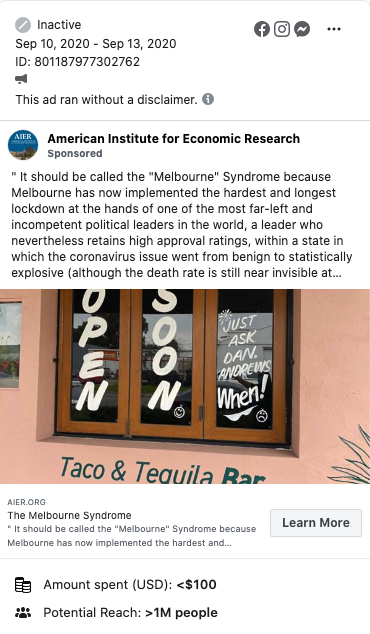
—
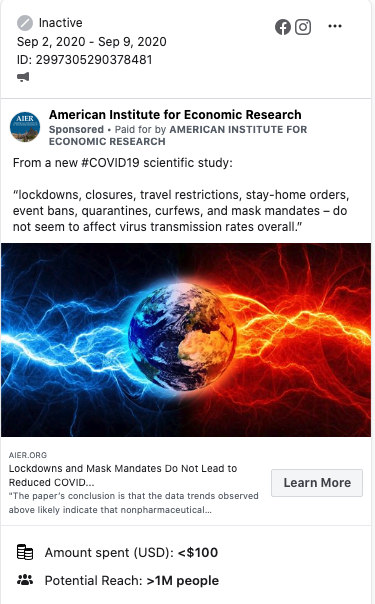
—
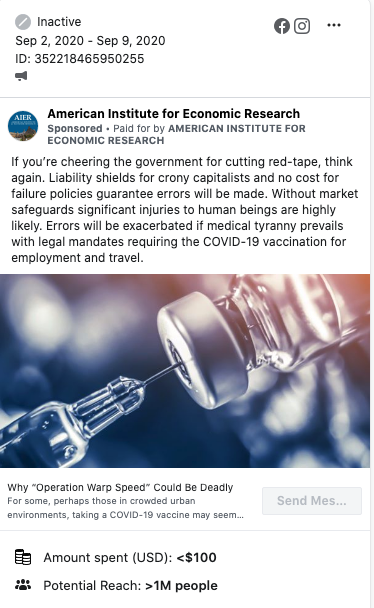
—
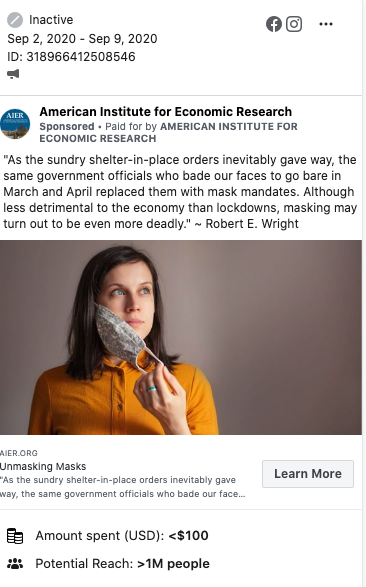
—
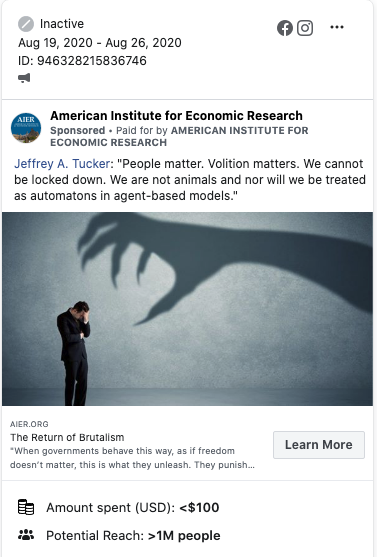
—
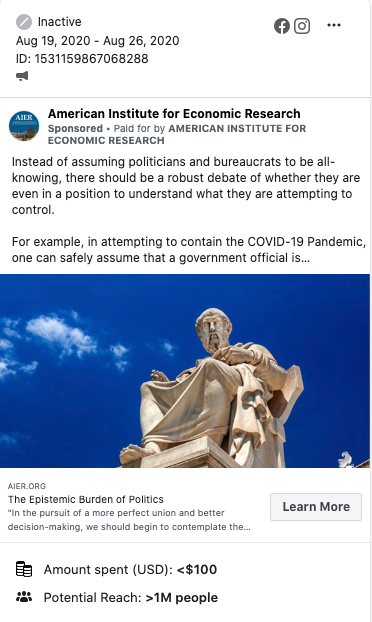
—
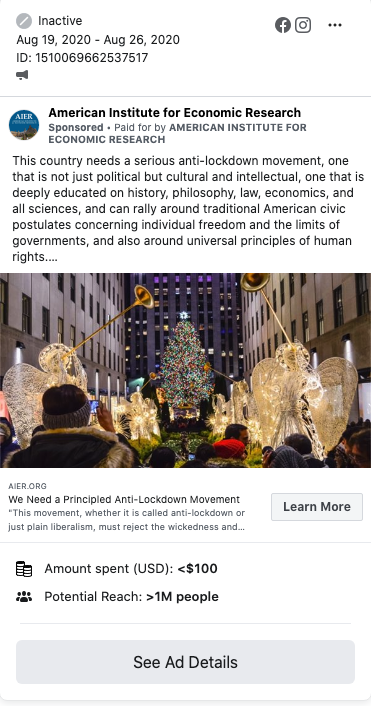
—
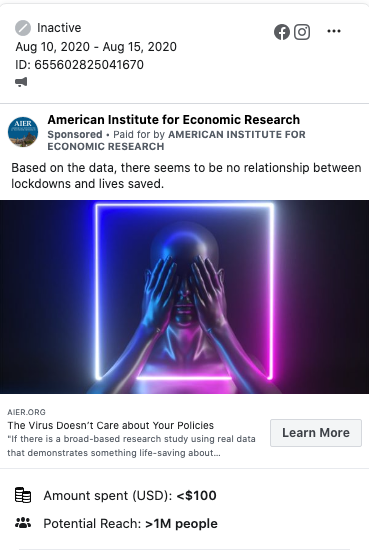
—
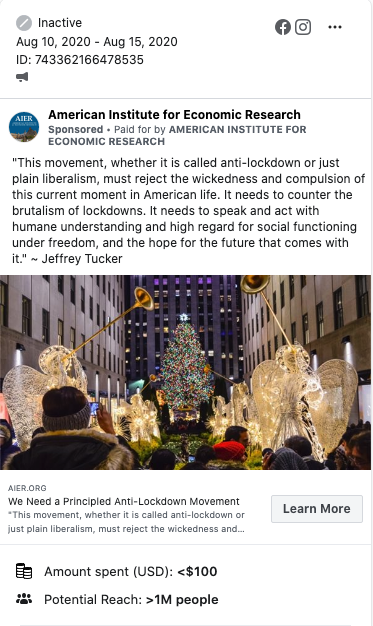
—
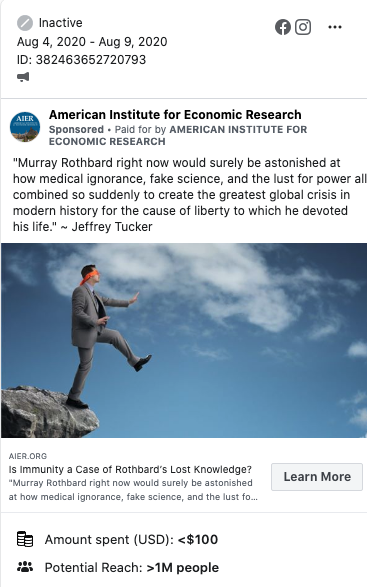
—
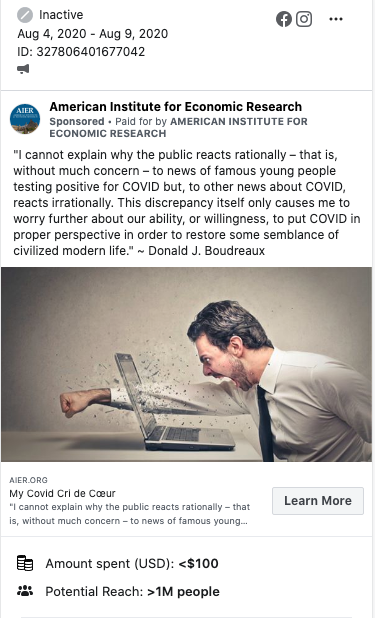
—
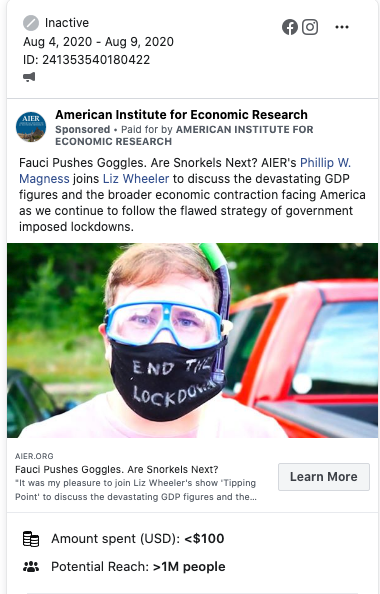
November 2–3, 2007
AIER sponsored a conference titled “The Global Warming Debate Science, Economics, and Policy.”159“The Global Warming Debate: Science, Economics, and Policy” (PDF), Economic Education Bulletin (Published by AIER), Vol. XLVIII No. 5 (May 2008). Archived .pdf on file at DeSmog.
AIER wrote in its issue of its Economic Education Bulletin covering the event:
“Much of the public discussion of global warming focuses on strategies to prevent it, but we also brought in speakers who talked about the potential for ‘mitigation and adaptation.’ They addressed the science and the economics behind proposals that focus on adjusting to global climate change, rather than preventing it.”
The list of participants included:
- E. Calvin Beisner
- David S. Chapman
- William R. Cotton
- William M. Gray
- Kenneth P. Green
- David Henderson
- Edward J. Kane
- Richard S. Lindzen
- Ross McKitrick
- Robert O. Mendelsohn
- Gilbert E. Metcalf
- Gordon E. Michaels
- James I. Mills
- Robert H. Nelson
- Claudia Rosett
- Richard L. Stroup
- Peter J. Wilcoxen
- Carl Wunsch
According to AIER:
“We also included a panel of speakers to address a topic that has received little attention from the media: the theology and ethics of global warming. Views on the environment often have theological or spiritual undertones. For some, the guiding principle is God’s command in Genesis that man shall ‘have dominion over the fish of the sea, the birds of the air, and the cattle, and over all the wild animals and all the creatures that crawl on the ground.’ But many also view Nature as an expression of God’s handiwork and still others find in Nature a substitute for formal religion or a belief in God. Both of the latter groups tend to view Nature as something to be protected from mankind. This view, as much as scientific understanding, seems to drive fears and warnings that global warming could be a calamity for the planet and for mankind.”
This latter panel included discussion from E. Calvin Beisner, national spokesman for the Cornwall Alliance for the Stewardship of Creation, who introduced himself as “ explicitly as a Christian committed to the Bible as the Word of God and as the source of the world view that enables us properly to understand God’s creation.”
Beisner said:
“As we think about creation stewardship, then, the very first thing we must keep in mind is the doctrine of God—particularly, that an infinitely wise, infinitely powerful Creator made and sustains the universe and every part of it. From this we can infer that the design of all things reflects the wisdom of God, and the sustaining of all things reflects the power of God. These truths are immediately relevant to creation stewardship in general and to the climate change debate in particular.”
[…]
“In short, these developments provide good reason to reject or at least to question seriously the popular claim that human action is driving catastrophic climate change and to conclude instead, as the Cornwall Alliance’s ‘Call to Truth’ did, that recent and foreseeable climate change are cyclical, largely (even if not totally) natural, well within the bounds of historic variability.”
On coal, he commented:
“we dig up the coal, burn it, and make from it energy that serves our needs plus carbon dioxide that enhances plant growth […] Any Christian should recognize the figure: death,
burial, and resurrection to impart new life to others.”
Related Organizations
- Atlas Network — Member.160“AMERICAN INSTITUTE FOR ECONOMIC RESEARCH,“ Atlas Network global directory. Archived October 20, 2020. Archive URL: https://archive.vn/3S5Ca
- Progress Foundation — AIER’s “sister organization located in Zurich, Switzerland.”161“Our Staff,” AIER.org. Archived April 25, 2008. Archive URL: https://archive.is/Wj0UQ
The Progress Foundation was established in 1973 in Lugano by AIER‘s founder Edward C. Harwood. “The purpose of the Progress Foundation was to ascertain the beneficial and detrimental influences in the progress of civilization, and offer these insights directly to the public.” Initially, the foundation “concentrated on awarding stipends to students at Swiss universities to fund their studies at the AIER.” It moved its headquarters to Zurich in 2002.162“HISTORY,” Progress Foundation. Archived October 22, 2020. Archive URL: https://archive.vn/LpKqX
According to the Progress Foundation, “Prior to this, the Foundation spent a long period responding to legal proceedings that stemmed from a dispute between the U.S. Securities and Exchange Commission (SEC), Harwood, and the American Institute for Economic Research (AIER), founded by Harwood, in the United States. The SEC was of the opinion that Harwood had also used Progress Foundation for services that needed to have been registered in the United States.”
- American Investment Services — Wholly owned by AIER.163“Our Staff,” AIER.org. Archived April 25, 2008. Archive URL: https://archive.is/Wj0UQ
- Bastiat Society — Run by AIER.164“About the Bastiat Society,” AIER. Archived October 20, 2020. Archive URL: https://archive.vn/7y6N3
Contact & Address
According to the AIER website:165“Who We Are,” AIER. Archived October 19, 2020. Archive URL: https://archive.vn/faFN0
250 Division Street | PO Box 1000
Great Barrington, MA 01230-1000
Telephone: 1-888-528-1216 | Fax: 1-413-528-0103
Social Media
- @aier on Twitter
- @aierdotorg on FaceBook
- AIERvideo on YouTube
- aierdotorg on Pinterest
- American Institute for Economic Research on LinkedIn
Other Resources
Other Resources
- “Great Barrington Declaration,” Wikipedia.
- “American Institute for Economic Research,” Wikipedia
- “American Institute for Economic Research,” Media Bias/Fact Check
Resources
- 1
- 2“Edward C. Harwood: A Biographical Sketch in Film,” AIER, March 20, 2019. Archived October 19, 2020. Archive URL: https://archive.vn/wgI7O
- 3Edward Stringham. “Stringham appointed as the Davis Professor for Economic Organizations and Innovation at Trinity College,” ThinkMarkets, May 20, 2015. Archived October 22, 2020. Archive URL: https://archive.vn/YQUpU
- 4“Peter J. Boettke,” Peter-Boettke.com. Archived October 22, 2020. Archive URL: https://archive.vn/YQUpU
- 5Edward Peter Stringham’s CV, as of Fall 2020. Retrieved from Trinity College. Archived .pdf on file at DeSmog.
- 6“Edward Stringham,” Trinity College faculty profile. Archived October 22, 2020. Archive URL: https://archive.vn/MKMX9
- 7
- 8
- 9
- 10“The Global Warming Debate: Science, Economics, and Policy” (PDF), Economic Education Bulletin (Published by AIER), Vol. XLVIII No. 5 (May 2008). Archived .pdf on file at DeSmog.
- 11Lee Fang. “SPHERE OF INFLUENCE: HOW AMERICAN LIBERTARIANS ARE REMAKING LATIN AMERICAN POLITICS,” The Intercept, August 9, 2017. Archived October 19, 2020. Archive URL: https://archive.vn/594Pw
- 12“Dozens of public health groups, experts blast ‘herd immunity’ strategy backed by White House,” The Hill, October 15, 2020. Archived October 21, 2020. Archive URL: https://archive.vn/OIw8m
- 13“WHO chief says herd immunity approach to pandemic ‘unethical‘,” The Guardian. October 12, 2020. Archived October 21, 2020. Archive URL: https://archive.vn/VzXle
- 14“Climate Science Denial Network Behind Great Barrington Declaration,” Byline Times, October 9, 2020. Archived October 19, 2020. Archive URL: https://archive.vn/ihgEF
- 15Domain Whois record for gbdeclaration.org. CentralOPS. Report generated October 19, 2020. Archived .pdf on file at DeSmog.
- 16“Great Barrington Declaration,” gbdeclaration.org. Archived October 19, 2020. Archive URL: https://archive.vn/4NCm5
- 17“Researchers Blast ‘Dangerous’ COVID-19 Herd Immunity Strategy,” MedPage Today, October 14, 2020. Archived October 19, 2020. Archive URL: https://archive.vn/bkx2v
- 18“The Great Barrington Declaration claiming to represent over 5,000 medical & public health scientists to promote herd immunity from #COVID19 is a gigantic fraud,” Twitter thread by user @NafeezAhmed. Archived .pdf on file at DeSmog.
- 19“Climate Science Denial Network Behind Great Barrington Declaration,” Byline Times, October 9, 2020. Archived October 19, 2020. Archive URL: https://archive.vn/ihgEF
- 20“What Is Herd Immunity? (video),” American Institute for Economic Research, October 15, 2020. Archived October 20, 2020. Archived .mp4 on file at DeSmog. Archive URL:https://archive.vn/HnvEk
- 21“Town Rejects Affiliation with ‘Great Barrington Declaration’,“ Great Barrington Massachusetts, October 15, 2020. Archived October 22, 2020. Archive URL: https://archive.vn/DWQly
- 22Joakim Book. “Climate Catastrophism and a Sensible Environmentalism,” AIER, October 22, 2020. Archive URL: https://archive.vn/EEG0L
- 23Joakim Book. “Climate Catastrophism and a Sensible Environmentalism,” AIER, October 22, 2020. Archive URL: https://archive.vn/EEG0L
- 24Joakim Book. “Climate Catastrophism and a Sensible Environmentalism,” AIER, October 22, 2020. Archive URL: https://archive.vn/EEG0L
- 25Joakim Book. “Climate Catastrophism and a Sensible Environmentalism,” AIER, October 22, 2020. Archive URL: https://archive.vn/EEG0L
- 26Joakim Book. “Climate Catastrophism and a Sensible Environmentalism,” AIER, October 22, 2020. Archive URL: https://archive.vn/EEG0L
- 27Richard M. Ebeling. “Impeachment at Home and Climate Hysteria Abroad,” AIER, October 1, 2019. Archived October 10, 2020. Archive URL: https://archive.vn/mxxYB
- 28Raymond C. Niles. “Climate Change and the Power of Scaremongering,” AIER, January 14, 2019. Archived October 21, 2020. Archive URL: https://archive.vn/6P5R0
- 29“The Global Warming Debate: Science, Economics, and Policy” (PDF), Economic Education Bulletin (Published by AIER), Vol. XLVIII No. 5 (May 2008). Archived .pdf on file at DeSmog.
- 30“A Climate of Opinion: The Kyoto Protocols and Atmospheric Science” (PDF), Economic Education Bulletin, Vol. XLI, No. 7 (July 2001). Archived .pdf on file at DeSmog.
- 31“Global Warming and Other Environmental Myths: The Economic Consequences of Fact vs. Media Perception” (PDF), Research Reports (Publication of AIER), Vol. LIX, Nol. 19 (October 5, 1992). Archived .pdf on file at DeSmog.
- 32“The Global Warming Debate: Science, Economics, and Policy” (PDF), Economic Education Bulletin (Published by AIER), Vol. XLVIII No. 5 (May 2008). Archived .pdf on file at DeSmog.
- 33Search for “Bastiat Society,” Conservative Transparency. Search performed December 10. 2020.
- 34“About AIS,” American Investment Services. Archived October 22, 2020. Archive URL: https://archive.vn/UnoBF
- 35“NO. 106 – A GUIDE TO CLASSICAL LIBERAL THINK TANKS,” The Heartland Institute, February 10, 2005. Archived .pdf on file at DeSmog.
- 36“About AIS,” American Investment Services. Archived October 22, 2020. Archive URL: https://archive.vn/UnoBF
- 37“Climate Science Denial Network Behind Great Barrington Declaration,” Byline Times, October 9, 2020. Archived October 19, 2020. Archive URL: https://archive.vn/ihgEF
- 38“American Investment Services, Inc. – Latest 13F Holdings, Performance, AUM,” Fintel. June 20, 2025. Archived .pdf on file at DeSmog.
- 39GOVERNANCE,” American Institute for Economic Research. Archived April 2, 2016. Archive URL: https://archive.ph/aQVO9
- 40
- 41“Benjamin Powell,” Independent Institute. Archived May 4, 2021. Archive URL: https://archive.ph/GSH6i
- 42Naveena Sadasivam and Jordan Sigler. “Hostile Takeover,” Texas Observer, September 26, 2016. Archived May 4, 2021. Archive URL: https://archive.ph/48SXv
- 43“JMC FELLOW ED STRINGHAM APPOINTED PRESIDENT OF AIER,” Jack Miller Center, June 6, 3027. Archived May 4, 2021. Archive URL: https://archive.ph/lmuNw
- 44“Edward Peter Stringham” (PDF – CV), Edwardpeterstringham.wordpress.com, Spring 2020. Archived .pdf on file at DeSmog.
- 45Google Scholar Search for authors Benjamin Powell and Edward Stringham. Performed May 4, 2021. Archived .pdf on file at DeSmog.
- 46“AIER Governance,” AIER. Archived October 24, 2020. Archive URL: https://archive.ph/6m7Ez
- 47“AIER Governance,” AIER. Archived May 5, 2021. Archive URL: https://archive.ph/Gq4aR
- 48“Stephen Miller,” LinkedIn. Accessed May 2021.
- 49Jane Mayer. Dark Money: The Hidden History of the Billionaires Behind the Rise of the Radical Right. Doubleday (January 2016).
- 50Nancy MacLean. Democracy in Chains: The Deep History of the Radical Right’s Stealth Plan for America. Penguin Books (June 2018).
- 51“Benjamin Powell,” Independent Institute. Archived May 10, 2021. Archive URL: https://archive.ph/GSH6i
- 52“Benjamin Powell, Ph.D,” Free Market Institute. Archived May 10, 2021. Archive URL: https://archive.ph/Md7nA
- 53“Bradley K. Hobbs,” Clemson Institute. for the Study of Capitalism. Archived May 10, 2021. Archive URL:https://archive.ph/9rDd6
- 54“Faculty and Staff Profile,” Wilbur O. and Ann Powers College of Business. Archived May 10, 2021. Archive URL: https://archive.ph/JvzKo
- 55“Cash for Comments Economists Network,” SourceWatch. Accessed May 10, 2021.
- 56“Doubling the Tobacco Tax Double Crosses the Public.” Retrieved from Tobacco industry documents library at UCSF. Bates No. TI50960813-TI50960816. Archived .pdf on file at DeSmog.
- 57“J.R. Clark, Ph.D.,” The University of Tennessee Chattanooga College of Business. Archived June 25, 2017 Archive URL: https://archive.ph/Wgms1
- 58
- 59
- 60“Edward P. Stringham,” Independent Institute. Archived May 11, 2021. Archive URL: https://archive.ph/q3Oxv
- 61
- 62“JMC 2015/2016 Fellows Directory” (PDF), Jack Miller Center. Archived .pdf. on file at DeSmog.
- 63“Edward Peter Stringham,” LinkedIn. Accessed May 2021. Archived .pdf on file at DeSmog.
- 64“Stephen Miller,” LinkedIn. Accessed May 2021.
- 65“Former Mass. Executive Named New AIER President,” iBerkshires.com, July 23, 2012. Archived May 11, 2021. Archive URL: https://archive.ph/Lyyag
- 66“Expert Search,” The Heartland Institute. Archived August 1, 2014. Archive URL: https://archive.ph/zJfCE
- 67“Research Fellows,” The Independent Institute. Archived August 27, 2005. Archive URL: https://archive.ph/7o83c
- 68“2018 Annual Report” (PDF), Media Research Center. Archived .pdf on file at DeSmog.
- 69“Peter Calcagno,” LinkedIn. Accessed May 2021. Archived .pdf on file at DeSmog.
- 70
- 71“Richard M. Ebeling,” Foundation for Economic Education. May 11, 2021. Archived URL: https://archive.ph/w9iKn
- 72
- 73“Prof. David G. Tuerck,” The Federalist Society. Archived May 10, 2021. Archive URL: https://archive.ph/e4nGs
- 74“David G. Tuerck, PhD,” The Beacon Hill Institute. Archived May 10, 2021. Archive URL: https://archive.ph/u01Vd
- 75“Policy Expert – David G. Tuerck,” Texas Public Policy Foundation. Archived October 13, 2007. Archive URL: https://archive.ph/mfNNX
- 76
- 77
- 78“New Anti-Merger Theories: A Critique” (PDF), Cato Journal Vol. 20, No. 3 (Winter 2001).
- 79“Faculty and Staff Profile: Gerald P Dwyer,” Wilbur O. and Ann Powers College of Business. Archived May 10, 2021. Archive URL: https://archive.ph/xRHOb
- 80“CEI Board of Directors,” Competitive Enterprise Institute. Archived March 15, 2016. Archive URL:https://archive.ph/5LsE7
- 81“Kerry Halferty Hardy,” LinkedIn. Accessed May 2021. Archived .pdf. on file at DeSmog.
- 82
- 83“Ramon DeGennaro,” Mercatus Center. Archived May 11, 2021.
- 84“Raymond C. Niles,” American Institute for Economic Research. Archived May 11, 2021. Archive URL: https://archive.ph/lVziL
- 85
- 86“Terry Kibbe,” Competitive Enterprise Institute. Archived November 9, 2006. Archive URL: https://archive.ph/1kKvC
- 87“Terry W. Anker,” The Philadelphia Society. Archived May 11, 2021. Archive URL: https://archive.ph/t4u6D
- 88
- 89“Brad DeVos,” LinkedIn. Accessed May 10, 2021. Archived .pdf on file at DeSmog.
- 90
- 91“Tag Archives: Economics,” The Columbia Economics Club. Archived May 10, 2021. Archive URL: https://archive.ph/OrVcB
- 92
- 93
- 94“Adam Thierer,” LinkedIn. Accessed May 2021. Archived .pdf on file at DeSmog.
- 95
- 96“ALEXANDER WILLIAM SALTER,” The Heartland Institute. Archived May 10, 2021. Archive URL: https://archive.ph/hgLAe
- 97
- 98
- 99
- 100“Brian C. Albrecht” (CV – PDF), BrianCAlbreht.com, March 11, 2021.Archived .pdf. on file at DeSmog.
- 101“CHARLES W. BAIRD,” The Heartland Institute. Archived May 10, 2021. Archive URL: https://archive.ph/s5Xay
- 102“David R. Henderson,” Hoover Institution. Archived May 10, 2021. Archive URL: https://archive.ph/yysmb
- 103“David R. Henderson,” Fraser Institute. Archived May 10, 2021. Archive URL: https://archive.ph/RkmyF
- 104“Donald J. Boudreaux,” Competitive Enterprise Institute. Archived July 28, 2014. Archive URL: https://archive.ph/vFaPr
- 105“Adjunct Scholars: Donald J. Boudreaux,” Cato Institute. Archived February 13, 2021. Archive URL: https://archive.ph/4SXHG
- 106
- 107“Fergus Hodgson,” John Locke Foundation. Archived May 10, 2021. Archive URL: https://archive.ph/Ahwm1
- 108“Fergus Hodgson,” LinkedIn. Accessed May 2021. Archived .pdf. on file at DeSmog.
- 109
- 110“George F. Gilder,” Independent Institute. Archived May 10, 2021. Archive URL: https://archive.ph/9Suye
- 111“Gerald P. O’Driscoll Jr.,” Cato Institute. Archived May 10, 2021. Archive URL: https://archive.ph/bNziT
- 112
- 113
- 114
- 115
- 116
- 117
- 118“Lawrence H. White,” LinkedIn. Accessed May 11, 2021. Archived .pdf on file at DeSmog.
- 119
- 120“Lawrence H. White,” Cato Institute. Archived January 14, 2013. Archive URL: https://archive.ph/0nUkV
- 121“FEE FACULTY,” Foundation for Economic Education. Archived March 12, 2012. Archive URL:https://archive.ph/ubSM3
- 122
- 123“Michael C. Munger,” Independent Institute. Archived May 11, 2021. Archive URL: https://archive.ph/HhSSF
- 124“Michael C. Munger,” Sandford School of Public Policy at Duke University. Archived May 11, 2021. Archive URL: https://archive.ph/tqyFi
- 125“Michael C. Munger” (PDF- CV), Duke University. Archived .pdf on file at DeSmog.
- 126
- 127“NICOLAS CACHANOSKY” (PDF – CV), May 5, 2021.
- 128“NICOLÁS CACHANOSKY, PH.D.” Atlas Network. Archived May 11, 2021. Archive URL: https://archive.ph/hcZ3t
- 129
- 130“Bio — Peter J. Boettke,” peter-boettke.com. Archived May 11, 2021. Archive URL: https://archive.ph/olnRB
- 131“COMPANY,” Free to Choose Network. Archived September 7, 2018. Archive URL: https://archive.ph/hMGI5
- 132
- 133“Robert Bradley Bio” (PDF), Institute for Energy Research. March 3, 2015. Archived .pdf on file at DeSmog.
- 134“Robert L. Bradley Jr.” Cato Institute. Archived August 7, 2021. Archive URL: https://archive.ph/bpBqr
- 135“ROBERT BRADLEY,” The Heartland Institute. Archived October 14, 2017. Archive URL: https://archive.ph/qqmk8
- 136“Robert L. Bradley Jr.” Mackinac Center for Public Policy. Archived May 11, 2021. Archive URL: https://archive.ph/zOjrn
- 137“ROBERT L. BRADLEY JR.” Competitive Enterprise Institute. Archived May 11, 2021. Archive URL:https://archive.ph/NFDEK
- 138“The Enron scandal,” USASurvival.org. Archived March 15, 2010. Archive URL: https://archive.ph/fAftd
- 139
- 140
- 141“Board of Directors,” Acton Institute. Archived December 24, 2010. Archive URL: https://archive.ph/kySdK
- 142“CURRICULUM VITAE” (PDF), Policy Experts,2007. Archived .pdf on file at DeSmog.
- 143
- 144
- 145“2016 Atlas Summit” (PDF), The Atlas Society, 2016. Retrieved from Silo.tips. Archived .pdf on file at DeSmog.
- 146
- 147“Reagan Sobel,” American Institute for Economic Research. Archived May 11, 2021. Archive URL: https://archive.ph/UloFE
- 148
- 149“Chloe Anagnos Pierce,” LinkedIn. Accessed May 2021. Archived .pdf. on file at DeSmog.
- 150
- 151“Roads to Sound Money, Edited by Judy Shelton,” AIER, November 16, 2020. Archived May 11, 2021. Archive URL: https://archive.ph/cYH7d
- 152“DR DAVID M. HART PHD (KING’S COLLEGE, CAMBRIDGE), MA (STANFORD), BA (HONS) (MACQUARIE, SYDNEY),” David Hart’s Webpage. Archived May 10, 2021. Archive URL: https://archive.ph/QKFS3
- 153“Jason Kelly,” LinkedIn. Accessed May 2021. Archived .pdf on file at DeSmog.
- 154
- 155Avian Jankovic. “The Political Economy of Mass Panic,” AIER, February 2, 2021. Arrchived February 17, 2021. Archive URL: https://archive.vn/LtKpH
- 156
- 157Avian Jankovic. “The Political Economy of Mass Panic,” AIER, February 2, 2021. Arrchived February 17, 2021. Archive URL: https://archive.vn/LtKpH
- 158Avian Jankovic. “The Political Economy of Mass Panic,” AIER, February 2, 2021. Arrchived February 17, 2021. Archive URL: https://archive.vn/LtKpH
- 159“The Global Warming Debate: Science, Economics, and Policy” (PDF), Economic Education Bulletin (Published by AIER), Vol. XLVIII No. 5 (May 2008). Archived .pdf on file at DeSmog.
- 160“AMERICAN INSTITUTE FOR ECONOMIC RESEARCH,“ Atlas Network global directory. Archived October 20, 2020. Archive URL: https://archive.vn/3S5Ca
- 161
- 162
- 163
- 164
- 165


